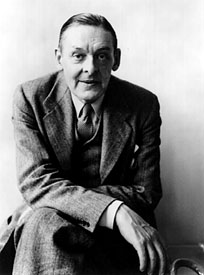The first time I heard Little Gidding was in a secret literary society, a group who met under the cover of night back in college. Just like it sounds, the group was very Dead Poet’s Society, and this particular night was my first time to timidly grace the doors of the unknown literary fervor. As a Robin Williams figure enthusiastically recited and explicated the poem, I was spellbound, letting the words wash over me for the rest of the night. A few years later I actually visited Little Gidding, an old religious community in England that inspired Eliot’s poem. For years, I’ve found great comfort in Eliot’s questions, his complex desire for simplicity, and his hope that all shall be well. Plus, the poem is breathtakingly beautiful. In the text, Eliot shows the goodness of sacrifice and necessity of suffering to unifying a fractured self and broken society. What he says about love, time, memory, and suffering resonates with me and at the same time is beyond me. I can read and study it for days and still not completely grasp all the allusions and plumb the depths of its significance. And so it continually draws me back to ruminate on its queries and feed on its hope.
Little Gidding by T.S. Eliot, section V
What we call the beginning is often the end
And to make and end is to make a beginning.
The end is where we start from. And every phrase
And sentence that is right (where every word is at home,
Taking its place to support the others,
The word neither diffident nor ostentatious,
An easy commerce of the old and the new,
The common word exact without vulgarity,
The formal word precise but not pedantic,
The complete consort dancing together)
Every phrase and every sentence is an end and a beginning,
Every poem an epitaph. And any action
Is a step to the block, to the fire, down the sea’s throat
Or to an illegible stone: and that is where we start.
We die with the dying:
See, they depart, and we go with them.
We are born with the dead:
See, they return, and bring us with them.
The moment of the rose and the moment of the yew-tree
Are of equal duration. A people without history
Is not redeemed from time, for history is a pattern
Of timeless moments. So, while the light fails
On a winter’s afternoon, in a secluded chapel
History is now and England.
With the drawing of this Love and the voice of this Calling
We shall not cease from exploration
And the end of all our exploring
Will be to arrive where we started
And know the place for the first time.
Through the unknown, unremembered gate
When the last of earth left to discover
Is that which was the beginning;
At the source of the longest river
The voice of the hidden waterfall
And the children in the apple-tree
Not known, because not looked for
But heard, half-heard, in the stillness
Between two waves of the sea.
Quick now, here, now, always–
A condition of complete simplicity
(Costing not less than everything)
And all shall be well and
All manner of thing shall be well
When the tongues of flames are in-folded
Into the crowned knot of fire
And the fire and the rose are one.

You can read the full poem here.
Bonus: You should check out Makoto Fujimura’s artistic representation of the Four Quartets found here– http://www.makotofujimura.com/works/four-quartets/




















 There are several talented people, thankfully, who are up for the task of intimate, non-blog journaling. Sarah Manguso’s new book,
There are several talented people, thankfully, who are up for the task of intimate, non-blog journaling. Sarah Manguso’s new book,